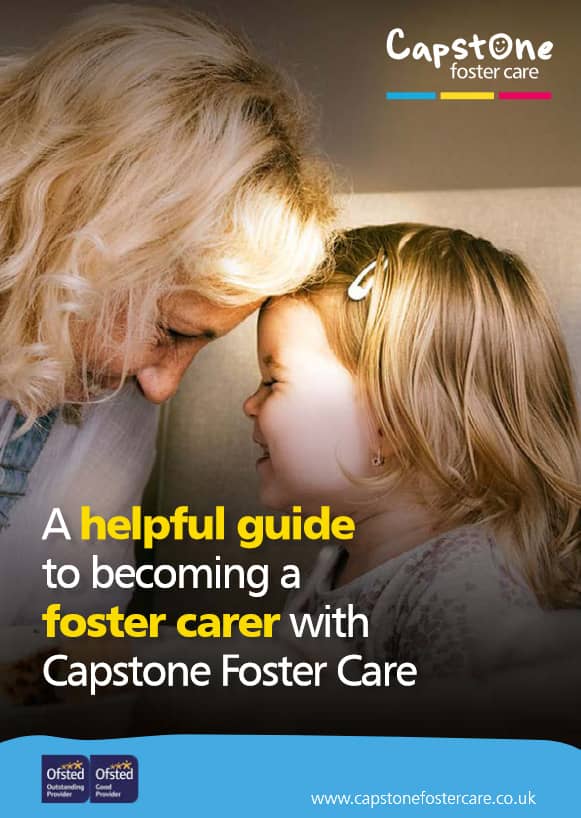


Fostering a disabled child
The role of an independent fostering agency
How to choose a foster care agency
Can I choose who I foster?
What are the benefits of fostering with an independent fostering agency?
What happens when a child is taken into care?
Fostering process: what happens on an initial home visit?
Fostering with local authority vs independent agency
A complete guide to becoming a foster carer
How Are Children in Foster Care Matched with Carers?
Foster Care Budgeting Tips
Becoming A Foster Carer
What is a Care Leaver?
What is a Foster Carer?
Fostering Regulations
How long does it take to become a Foster Carer?
What are the Foster Care requirements?
Changing IFA - Transferring to Capstone
8 reasons why a child may be taken into care
Fostering as a Career
Can you foster if you smoke or vape?
A guide to fostering assessments
LGBTQ+ Fostering
Equality, Inclusion & Anti-discriminatory Practice in Foster Care
What can disqualify you from foster care?
Can you foster if you’re on benefits?
Top transferable job skills to become a foster carer
Fostering as a same sex couple
Fostering while renting
Can you foster if you have mental health issues?
Is there an age limit for fostering in the UK?
Do foster carers get a pension?
How to foster a child: A step by step guide
How do DBS Checks Work?
Can I foster if...?
Mythbusting the top 10 Foster Care Myths
Can I foster if I am disabled?
LGBT Fostering Mythbusting
Can I foster if I have pets?
Can I Foster A Child?
Can I Foster and Work?
Can you Foster with a Criminal Record
Can Single People Foster?
LGBT Family and Foster Care
Fostering across Cultures
Muslim Fostering
Christian Foster Care
Sikh Fostering
Empty Nest Syndrome and Foster Care
Can I Foster?
What is the difference between residential care and foster care?
Fostering Babies and Young Children
What is Kinship Care?
Fostering Babies - Myths
Focusing on Parent & Child Fostering
Fostering Siblings
Fostering Teenagers
Fostering Teenagers - Breaking down the Myths
Fostering Unaccompanied and Asylum Seeking Children
Mother and Baby Foster Placements
Private Fostering
How does therapeutic fostering work?
Young Children Fostering Placements
Difference between short and long-term fostering
Types of self-harm
A Guide to the Foster Care Handbook
Reunification and Birth Parents: A Guide for Foster Carers
What is an EHC Plan? A Guide for Foster Carers
How to prepare a child for becoming a care leaver
Children who foster: impact of fostering on birth children
Fostering LGBTQ+ Youth
How to prepare your home for a foster child
How to help a lonely child: A Guide for Foster Carers
What are the National Minimum Standards for Fostering Services?
10 tips for foster children's education
How to prepare your foster child for secondary school
Tips for coping when foster placements end
Tips for foster parents during Coronavirus
What happens if foster parents get divorced?
5 ways to manage Mother's Day with foster children
Tips for managing foster children's bedtime routines
How to handle foster child bullying
Fostering allowances and the gender pay gap
What discounts can foster carers get?
How to adopt from Foster Care
5 ways to manage Father's Day for children in foster care
8 most common fostering challenges
FosterTalk Membership with Capstone Foster Care
Supporting foster children's contact with birth families
A guide to independent fostering
Keeping Children Safe Online: A Guide For Foster Carers
Movies About Foster Care
Play-based learning strategies for foster carers
A Guide to the Staying Put Program
How to deal with empty nest syndrome
How to recognise signs of depression in foster children
Can you take a foster child on holiday?
Tips and advice on fostering with a disability
10 tips on connecting with your Foster Child
Fostering vs Adoption - What's the difference?
How Fostering can change a future
How to adopt from Foster Care
How to encourage children to read in Foster Care
How to prepare a Foster Child's bedroom
Reading and Storytelling with Babies and Young Children
Supporting Children's Learning
The 20 most recommended books Foster Carers and young people should read
Things you can do when your children leave home
The impact of early childhood traumas on adolescence and adulthood
Anxious Disorders in Foster Children
What is sexual abuse and sexual violence
Foster Child behaviour management strategies
Foster Parent Advice: What to expect in your first year of fostering
Capstone's twelve tips at Christmas
10 celebrities who grew up in Foster Care
Could Millenials be the solution to the Foster Care crisis?
Do you work in Emergency Services?
Form F Assessor and Assessment Training
Foster Care Fortnight
Improving Children's Welfare - Celebrating Universal Children's Day
New Year - New Career - Become a Foster Carer
Young People Charities
Time for new resolutions, new plans, new hopes, new dreams. What are your resolutions?
Are you full of desire to make a change in your lifestyle? Are you considering changing careers or starting a brand new one?
Are you one of those people who have always wanted to make a difference?
This is the traditional time to make changes that will improve your life – or at least think about making changes. If you have recently retired and crave a more meaningful career please consider fostering.
Aside from the personal satisfaction, fostering is a desperately needed and extremely valuable service. There are thousands of children and young people in need of foster care in the UK.
Suppose you are thinking about taking this leap into 2019 with a new lease on life, talk it over with your family and your friends. There are a couple of reasons for doing this. One is that it is good to get honest feedback from the people who know you best. Another reason is that they should know that your lifestyle could be about to change.
Holiday plans, summer plans, family get-togethers are likely to be a bit different if you have children in care. Actually, everyday life will be different. Your friends and family need to be aware of the big changes you may be making soon. This is especially true if you have never experienced looking after children. If you have had children in your life, you will know the level of energy, patience, and compassion that is required.
There are as many reasons why people choose to foster as there are people fostering. Some foster carers got into fostering because they have skills and experience caring for children. Others have a strong wish to provide a positive experience for troubled children.
For one thing, being a foster parent is highly rewarding. This is a career where you are able to change the future for children and young people. The circumstances that cause a child to be taken into care are sometimes devastating. The experience can damage the child’s entire life. Unless – and this is where you come in – loving foster parents who can make a difference are there to build a brighter future for the child.
Fostering often begins when local authorities are made aware that children and young people are in danger.
Emergency placements are common. When there are enough foster carers we can make the best possible matches for children.
Possible outcomes for our looked after children include being returned to their family home, being placed with relatives, being placed in short term care or long term care. In some cases, the fostering placement evolves into adoption. The reality is, in the middle of the night the social worker needs a home right away. In a day or two, a longer term solution can be worked out.
There are some limitations on who can qualify but these are a few. You should be at least 21 years old. It doesn’t matter if you are single or married or in a coomitted relationship. You can be gay or lesbian. Your health is a major factor. You need to have the stamina and energy to care for active children.
Your home can be owned or rented. Space is the big factor. Each child needs to have his or her own bedroom unless we are able to place siblings together. it is also important that there is a place for children to play and do their homework.
Pets can be a valuable part of a fostering household. If you have pets, they need to be well trained and used to established routines.
Now that you have a brief glimpse of what fostering is all about, let’s take a look at how the process of becoming a foster parent works.
As mentioned, children come into care and have an urgent need for foster carers. Finding and training foster carers is frequently assumed by independent agencies such as Capstone Foster Care. One of the reasons for dedicated agencies such as Capstone is that the our agency focuses only on providing the best trained foster carers.
An agency builds a team and continually works on providing the most up-to-date information and training. The team is comprised of experts in the field of fostering. Our social workers and educators, our Form F assessors, our administration, and our support staff all have one goal in mind: the best possible placements for looked after children and the happiest more supported foster carers possible.
What on earth is a Form F assessor? If you apply to be a foster carer, the Form F assessor is the person who will be working with you through the application process. The form f is a bit like a very detailed CV of your life. Its not because we want to be nosey, its just that we want to support you to have the best possible matches for children to create the family fit for all. The can take up to six months but it is often three months. The reason it takes this long will be explained in a moment.
Who is this assessor? He or she is a social worker who is knowledgeable about the fostering process and will support you during to complete a fostering assessment. This social worker knows what comprises a really excellent foster carer and he or she is the person who prepares and presents the assessment to the agency’s fostering panel.
When the Form F is given to the panel for assessment, you will be invited to a meeting of the panel so that they can ask you specific final questions if they need to have something clarified.
To explain why the process takes several months, here is a summary of the process.
The assessment involves at least a half dozen meetings with a social worker. The first visit makes sure you have enough room for a foster child. The visits are about two hours long and take place every couple of weeks.
If you are a couple applying to be foster carers, you will be interviewed together a couple of times and at least once, you will be separately. If there are other people living in the household, even if they are children, they will also be involved as part of the fostering assessment process. The assessor will also speak with adult children who used to live in the household. They will need to talk to any ex-partners and they will assess any pets you have.
While this process is underway, you will be given updates on the progress of the application. You will start going to training sessions and meet other applicants as well as experienced trainers who are able to share their real-life experiences in fostering.
If this sounds rigorous, it is just proof of how important foster care is. Caring for children is one of the most essential jobs in the world. It also gives you a period of time to consider what fostering is all about and get to know the positives and negatives.
Diversity is a factor in fostering. Here is a quick statistical overview from 2015. Actually, it is from a specific day – 31 March, 2015 – but it is representative of the composition of the children in care at any given time. On that day, there were 69,540 children in care. Of these, 55% were boys and 38% were between 10 and 15 years old. 22% were 16 or over and 21% were between 5 and 9 years old. Only 5% were under a year old and 15% were between 1 and 4 years old.
Ethnically, 77% were white, 9% were of mixed racial background, 4% were Asian or Asian British, 7% were Black or Black British, 2% were from other ethnic groups, and 1% did not provide information. 75% of the children and young people were living with foster carers. The rest were living in secure units, children’s homes or hostels, placed with their parents, placed for adoption, or in residential schools or other residential settings.
Typical carers are Joy and Keith who made this career changing decision last January after Keith took early retirement. They had talked about fostering from time to time over the years and at New Year’s 2017, they realised the time had come.
They went through the assessment process and admit that the process seemed long and sometimes intrusive and emotional. However, they appreciated how comfortable and at ease their social worker made them feel. They were able to ask or tell her anything.
This statement from them captures it all.
Fostering can be emotional and challenging at times as it opens your mind up to things you wouldn’t understand what some children have been through but also extremely rewarding. Children no matter what they have been through or what issues they may have are still just children. Of course it changes your life and life style, but if you can keep calm when all around you and the children is falling apart, invest time, provide a safe, secure and loving environment the rewards of seeing a child who has had such a difficult time smile, laugh and most importantly be a child will be one of the greatest rewards you can have.
Joy and Keith have a child placed with them. The day you become an approved foster carer is not always, or even often, the day you have your first placement. Katie and Jon are recently approved foster carers and still waiting for their first placement.
Katie said, “My husband and I have talked about fostering for many years. I am a qualified primary school teacher and have enjoyed working with children all my working life and we now have 2 children of our own too. We are just starting out on our fostering journey and are looking forward to our first placement. We feel we have a lot to offer children who have not been as fortunate as our own, and we feel the time is right now as our own children are of an age that they can understand and embrace fostering with us.”
knowing that your love and care and patience can save a child and dramatically improve their outcome in life. Many foster children become a part of their foster family and continue to be part of the family well into adulthood.
Capstone Foster Care has offices throughout the UK. You can contact us here or phone us on 0800 012 4004. You are on the brink of being that foster carer who changes a child’s life and life chances. We look forward to hearing from you in 2018.
Happy New Year!
If you’ve got any questions or would like to find out more about fostering with Capstone, fill out the form below.
An experienced fostering advisor from your local area will then be in touch.

Start the conversation today. Our team of friendly advisors are on hand to answer any foster care questions you may have. We can offer you honest and practical advice that can help you decide if becoming a foster carer is the right path for you.


